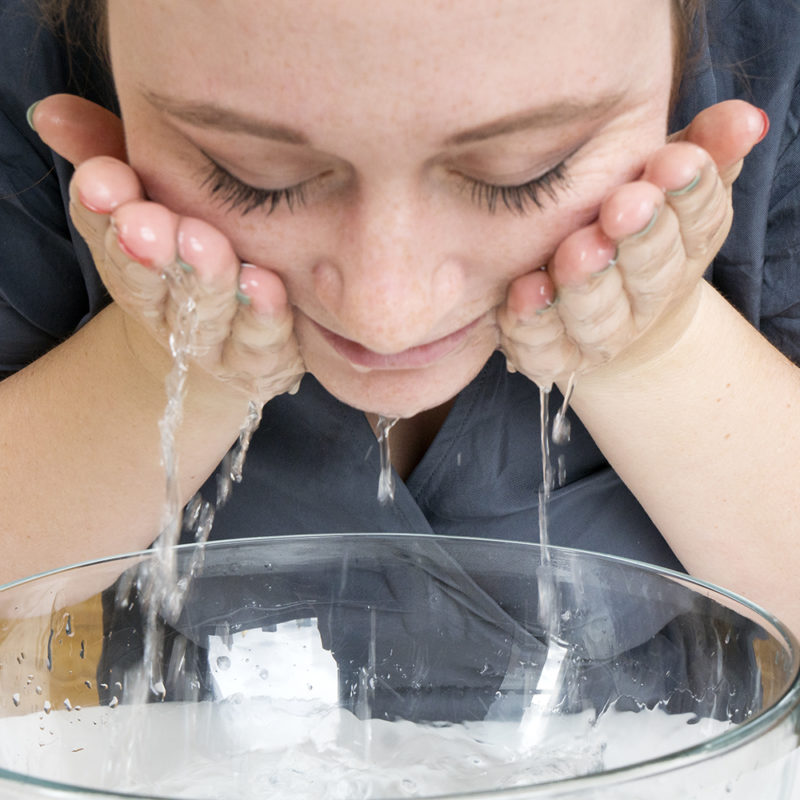Should you rinse off micellar water? Well, is your skin ever red and itchy and you can’t figure out why? Read on to find out why rinsing your micellar water might be the fix!
I’m not the first college student to seek out and latch onto “lazy beauty” hacks. When I first started using micellar water I thought I had found the holy grail. With one swipe on my face I was cleansed and ready for bed, right? Wrong. Eventually I saw the light and starting using the full gamut routine, but I kept my handy little micellar water for those inevitable lazy nights.
After doing some digging in my quest to soothe my high maintenance, sensitive combination skin I came across a YouTuber and a Reddit expert, Gothamista and Stephen Ko (kindofstephen), who both claimed I had been missing a key part: the post micellar rinse. This confused me since I always thought of micellar as a gentle alternative to harsher, sulfate-heavy cleansers. Both explained how micellar water is in fact gentle, but it can leave surfactants behind on the skin, which can become irritating depending on your skin type and it’s better to be on the safe side and just rinse.
So what exactly are these surfactants and what are the risks? Should I be rinsing? I turned to some very knowledgeable dermatologists to uncover the truth behind this micellar water claim.
First off, what is micellar water?
Micellar water is actually a mix of water and tiny, oily “micelles” that attract and help remove dirt, makeup, and debris from the surface of your skin. Joshua Zeichner, the Director of Cosmetic and Clinical Research in the Department of Dermatology at Mount Sinai Hospital, explains, “Micellar water is itself a cleansing solution. While it has a liquid base, it contains dirt traps known as micelles which remove impurities from the skin. Micelles are essentially surfactants or oil-in-water molecules.”
What are surfactants?
Surfactants are found in so many types of soaps and cleansers. They are attracted to oil and pull oily substances away from the surface of your skin. In theory, micellar water is supposed to be gentle enough to let the liquid stay on your skin.
“Although most people can tolerate residual surfactants on skin (especially if they are the gentle kind), some surfactants are irritating, and some people may even have an allergy to them,”says Rachel Nazarian, a dermatologist at Schweiger Dermatology Group in NYC. “If you have an allergy to surfactants you may find your skin becomes red, itchy, or puffy with repeated use. My recommendation is to always rinse micellar water off just to be safe.”
So then what’s up with surfactants? Are they going to be a problem in the long run?
There is technically no impact in the long run when using micellar water and not rinsing it off on skin that is compatible with it. Just be aware if your skin starts to look irritated, it won’t necessarily mean you need to get rid of your micellar water—it just means you need to rinse thoroughly after using it. “Micellar waters aren’t necessarily dangerous (so no risk to your overall health) [and] they don’t require rinsing, but if you have the time and energy, rinse anyway,” says Nazarian.
Bottom line:
A lot of the hesitation about micellar water comes from concerns that are usually apply to typical cleansers. However, as Nazarian says, if you have sensitive skin and have access to a sink, it is better to rinse! Just to be safe! You should always be paying attention to your skin’s individual needs and reactions to products. There is no one way to take care of skin, just suggestions and information about products and their ingredients. So if you are having problems with your cleansing routine and it includes micellar water, try adding a quick rinse in-between steps!
